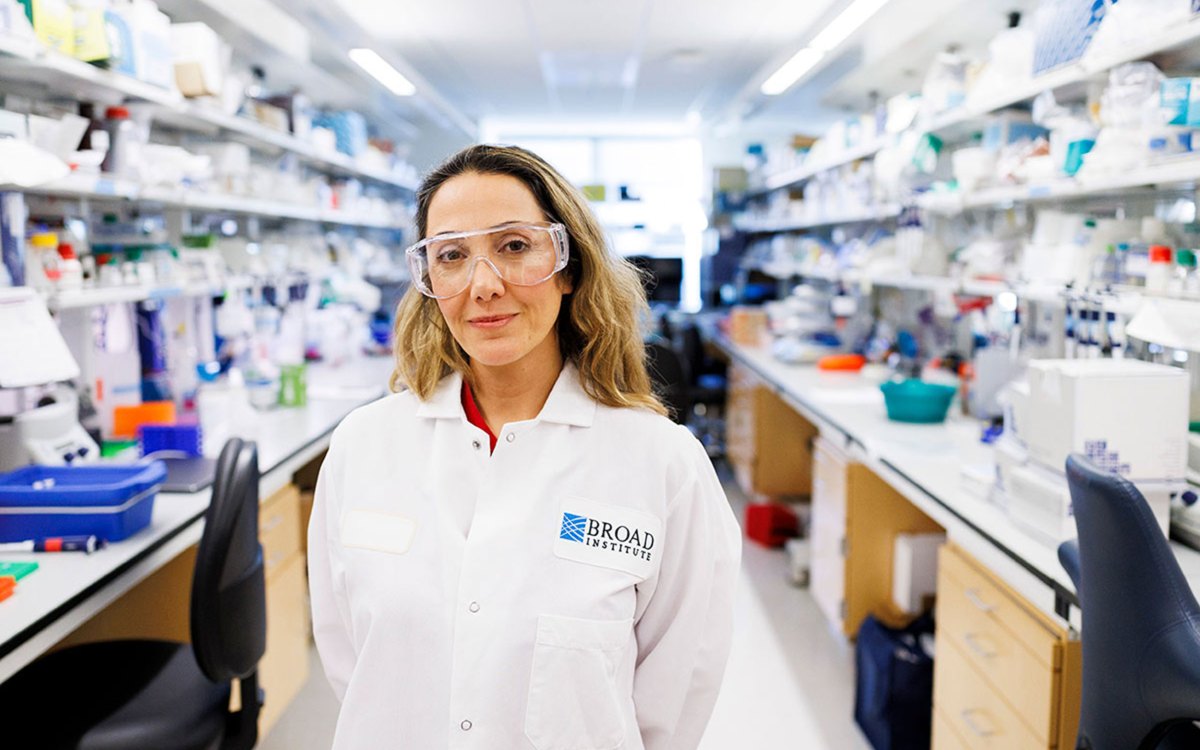Tag: Genetics
-
Health
Researchers identify promising gene target for neuroblastoma therapy
Researchers at Dana-Farber Cancer Institute have identified a set of previously unknown mutations in a single gene in 8 percent of neuroblastomas, tumors of the nervous system that occur in young children and account for approximately 15 percent of all childhood cancer deaths.
-
Health
Volunteers unveil DNA, medical data in push for everyday gene sequencing
The world moved a step deeper into the DNA age yesterday as 10 volunteers released their genetic and medical information on the Internet as part of a multi-year effort to…
-
Health
Major step forward in cell reprogramming
Imagine, if you can, a day within the next decade when a physician-scientist could remove a skin cell from your arm and with a few chemicals turn that fully formed adult cell into a dish of stem cells genetically matched to you.
-
Health
Genetic ‘fingerprint’ shown to predict liver cancer’s return
Scientists have reached a critical milestone in the study of liver cancer that lays the groundwork for predicting the illness’s path, whether toward cure or recurrence. By analyzing the tissue in and around liver tumors, an international research team has identified a kind of genetic “fingerprint” that can help predict whether cancers will return.
-
Campus & Community
Harvard-affiliated gene study receives NIH funding
Two Harvard Medical School (HMS) professors of ophthalmology are co-principal investigators of a gene project that has received funding by the National Institutes of Health (NIH). Lou Pasquale and Janey Wiggs, both glaucoma researchers at the Massachusetts Eye and Ear Infirmary, are leading the grant-winning team of researchers that includes Vincent L. Gregory Professor in…
-
Health
New approach to gene therapy may shrink brain tumors, prevent their spread
Massachusetts General Hospital (MGH) researchers are investigating a new approach to gene therapy for brain tumors — delivering a cancer-fighting gene to normal brain tissue around the tumor to keep it from spreading. An animal study described in the journal Molecular Therapy, the first study to test the feasibility of such an approach, found that…
-
Campus & Community
Broad Institute gets major grant for epigenomics research
Researchers at the Broad Institute of Harvard and MIT announced Sept. 30 that they have received a grant from the National Institutes of Health (NIH) to map the epigenomes of a variety of medically important cell types, including human embryonic stem cells.
-
Campus & Community
NIH selects nine Pioneers, Innovators from Harvard
Nine Harvard faculty members are among 47 scientists nationally whose promising and innovative work was recognized Monday (Sept. 22) with the announcement of two grant programs through the National Institutes of Health (NIH).
-
Health
Stem cell summit hails bench progress, looks to bedside future
New discoveries concerning cell reprogramming over the past year have boosted stem cell researchers in the lab and encouraged efforts to transfer test tube and lab animal advances to humans suffering degenerative diseases such as diabetes, Parkinson’s disease, and Lou Gehrig’s disease.
-
Campus & Community
Harvard faculty members net MacArthur fellowships
Three biologists — one current and two future faculty members at Harvard — have won MacArthur Foundation “genius” grants, $500,000 no-strings-attached awards intended to encourage creativity, originality, and innovation in a broad array of fields.
-
Health
HPV, cervical cancer link earns scientists Alpert Prize
Two scientists who discovered that specific types of human papillomavirus, or HPV, cause cancer of the cervix received the 20th annual Warren Alpert Foundation Scientific Prize on Sept. 15. As part of the day’s celebration, the prize winners Harald zur Hausen and Lutz Gissmann — both professors at the German Cancer Research Center in Heidelberg…
-
Campus & Community
Ruvkun among Lasker Award winners
Massachusetts General Hospital (MGH) and Harvard Medical School (HMS) investigator Gary Ruvkun is one of three co-recipients of the 2008 Lasker Award for Basic Medical Research.
-
Health
Harvard Medical School, MGH researcher Gary Ruvkun to share 2008 Lasker Award
Gary Ruvkun, a Harvard Medical School genetics professor in the Massachusetts General Hospital (MGH) Center for Computational and Integrative Biology, is one of three scientists named co-recipients of the 2008…
-
Campus & Community
NHGRI/NIH awards Harvard researchers $6.5M
The National Human Genome Research Institute (NHGRI), part of the National Institutes of Health (NIH), awarded a $6.5 million grant (over four years) to a team of Harvard University researchers to further develop electronic sequencing in nanopores. The grant is part of more than $20 million in total funding given by NHGRI/NIH to spur innovative…
-
Campus & Community
HMS to host quantitative genomics conference, more
The second annual Conference in Quantitative Genomics will be held Sept. 23-25 at the Harvard School of Public Health (HSPH). Hosted by the Program in Quantitative Genomics at the School, “Emerging Quantitative Issues in Parallel Sequencing” is supported with a grant from the National Cancer Institute and the National Heart, Lung and Blood Institute.
-
Campus & Community
Eli and Edythe Broad make unprecedented gift
Los Angeles-based philanthropists Eli and Edythe Broad on Sept. 4 declared the Broad Institute of Harvard and MIT an unprecedented success as an experiment in science and philanthropy and announced that they have increased their total gift to the Broad by $400 million to $600 million. The $400 million will be an endowment to convert…
-
Campus & Community
Broad awarded $86M NIH grant to develop chemical probes for disease
Researchers at the Broad Institute of Harvard and MIT have been chosen to receive a six-year, $86 million grant from the National Institutes of Health (NIH) to identify and develop molecular tools known as “small molecules,” which can probe proteins, signaling pathways, and cellular processes that are crucial to human health and disease.
-
Health
HSCI researchers see major breakthrough
In a feat of biological prestidigitation likely to turn the field of regenerative medicine on its head, Harvard Stem Cell Institute (HSCI) co-director Doug Melton and postdoctoral fellow Qiao “Joe” Zhou report having achieved what has long been a dream and ultimate goal of developmental biologists — directly turning a fully formed adult cell into…
-
Health
When genetics gets personal
Just five years after the Human Genome Project announced it had decoded the first human DNA, the era of personal genetics is dawning, bringing with it not just the promise of targeted, personalized medicine and a new level of self-knowledge, but also a host of ethical, legal, and practical issues. A new project out of…
-
Health
Eli and Edythe L. Broad endow the Broad Institute of Harvard and MIT with additional $400 million
Los Angeles-based philanthropists Eli and Edythe Broad today declared the Broad Institute of Harvard and MIT an unprecedented success as an experiment in science and philanthropy, and announced that they…
-
Health
Daley and colleagues create 20 disease-specific stem cell lines
Harvard Stem Cell Institute (HSCI) researcher George Q. Daley, associate director of the Stem Cell Program at Children’s Hospital Boston, has with HSCI colleagues Chad Cowan and Konrad Hochedlinger of Massachusetts General Hospital (MGH) produced a robust new collection of disease-specific stem cell lines, all of which were developed using the new induced pluripotent stem…
-
Health
A rare glimpse of schizophrenia’s genetic roots
The delusions and hallucinations of schizophrenia can be devastating for the 1% of the population struck by the disease. The condition clearly has a genetic component, evidenced by its tendency…
-
Health
Across species, genes evolve to minimize protein production errors
Scientists at Harvard University and the University of Texas, Austin, have found that genetic evolution is strongly shaped by genes’ efforts to prevent or tolerate errors in protein production.
-
Health
Aquatic genome captures foreign DNA
Long viewed as straitlaced spinsters, sexless freshwater invertebrate animals known as bdelloid rotifers may actually be far more promiscuous than anyone had imagined: Scientists at Harvard University have found that the genomes of these common creatures are chock-full of DNA from plants, fungi, bacteria, and animals.
-
Health
Molecular analysis confirms T. Rex’s evolutionary link to birds
Putting more meat on the theory that dinosaurs’ closest living relatives are modern-day birds, molecular analysis of a shred of 68-million-year-old Tyrannosaurus rex protein — along with that of 21…
-
Health
Genetics key in new knowledge about complex diseases
Genetic researchers crossed a critical threshold last year in their ability to understand complex diseases, posting a number of new discoveries that advanced knowledge of ailments caused by small contributions from multiple genes, the environment, and other causes.
-
Health
A Genetic Cause for Iron Deficiency
The discovery of a gene for a rare form of inherited iron deficiency may provide clues to iron deficiency in the general population – particularly iron deficiency that doesn’t respond…
-
Health
Study shows indicator for cardiovascular events
A study appearing in this week’s (March 19) New England Journal of Medicine (NEJM) confirms that a combination of gene variants previously associated with cholesterol levels does reflect patients’ cholesterol levels and can signify increased risk of heart attack, stroke, or sudden cardiac death. Led by researchers from the Massachusetts General Hospital (MGH) cardiology division,…
-
Health
Of flies and fish
During her schooldays in 1950s Germany, Christiane Nüsslein-Volhard rarely did her homework. In 1995, she won the Nobel Prize for physiology and medicine. Volhard is now director of the prestigious Max Planck Institute for Developmental Biology in Tübingen, where, decades before, she had been an undistinguished biochemistry undergraduate. She was at Harvard this week (March…
-
Health
Newly identified gene variants associated with prostate cancer risk
Three studies presenting newly identified genetic variants that are associated with increased susceptibility to prostate cancer were published recently (Feb. 10) on the advance online site of Nature Genetics. The 10 gene variants double the number of known variants associated with risk of the disease and are the result of genomewide association studies.


